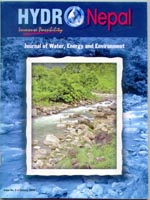Banker’s Perspectives on Hydropower Development in Nepal: Problems & Prospects
DOI:
https://doi.org/10.3126/hn.v2i0.1153Keywords:
Hydropower development, Hydropower financingAbstract
Nepal is currently facing a power shortage that, it is feared, will get worse if we do not start working to enhance our capacity for energy generation. Hydropower, as a clean and renewable source of energy, is the right solution for our country, with its topographical advantage and the availability of more than 6,000 rivers. In addition to local demand, there is ample scope for export of electricity to India. The process has already begun for infrastructure development to pave the way for export. This is the right time to move forward for the development of this sector by all involved stakeholders; viz., investors, financiers, government, the local public, political parties, etc. This combined effort will give momentum for further developing the hydropower sector. The financial sector must work on building in-house expertise as well as developing coalitions with other experienced international financial institutions to enhance the knowledge base and the lending capacity for project financing. Several tools for financing, including debentures, bonds and mutual fund, etc., can be introduced. We must now move forward to enhance our strength and mitigate the risks involved to realize: Nepal ko pani, pragati ko khani (literally: ‘Nepal’s water, source of national development’). Hydro Nepal: Journal of Water, Energy and Environment Vol. 1, No. 2(2008) pp. 9-12Downloads
Download data is not yet available.
Abstract
863
PDF
2958
Downloads
How to Cite
Shah, A. K. (2008). Banker’s Perspectives on Hydropower Development in Nepal: Problems & Prospects. Hydro Nepal: Journal of Water, Energy and Environment, 2, 9–12. https://doi.org/10.3126/hn.v2i0.1153
Issue
Section
Articles
License
The copyright of the articles and papers published is held by HYDRO Nepal Journal.
The views and interpretation in this journal are those of author(s), and HYDRO Nepal does not bear any responsibility for the views expressed by authors in the journal.




